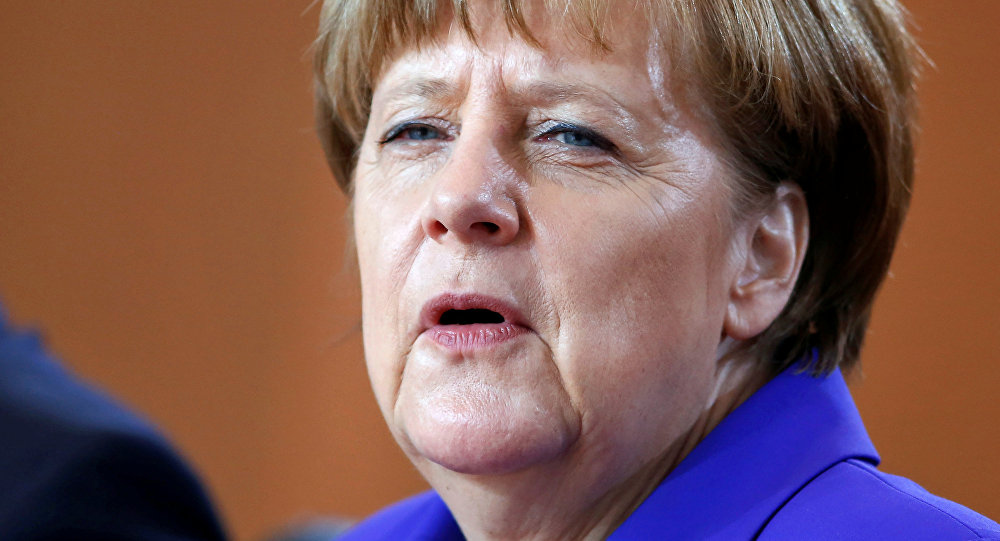Merkel Fights Poll Slump in Test Run for Election Next Year

EghtesadOnline: Angela Merkel is returning to the campaign trail for German state elections after a shortened summer break with her public support eroded by terror attacks and Europe’s unresolved crises.
Less than three weeks before the Sept. 4 ballot in the eastern region of Mecklenburg-Western Pomerania, the German chancellor plans to address a rally of her Christian Democratic Union on Wednesday as polls suggest the anti-immigration Alternative for Germany, or AfD, may reap a fifth of the vote in the Baltic coast state, which is home to her electoral district. Abroad, Russian President Vladimir Putin’s threats against Ukraine and uncertainty about a refugee accord with Turkey are testing Merkel’s standing as a crisis manager that’s been a key to her decade in power.
Though Germany’s mainstream parties are shunning alliances with the AfD, the party is harnessing public anxiety about mass migration. Its advance underscores the risks to Merkel from her refugee policy as she considers seeking a fourth term in next year’s general election.
Merkel interrupted her summer vacation last month to defend her open-border refugee policy after a series of attacks in Germany, two of them committed by asylum seekers who had pledged allegiance to Islamic State. Her approval rating slumped 12 percentage points to 47 percent in an Infratest poll published Aug. 5, though her party still leads in all national polls. Bavarian state premier Horst Seehofer, a critic of Merkel’s refugee policy whose CSU party is part of her governing coalition, saw his popularity rise.

The flash of violence, which included an ax attack on a train and a suicide bombing at a festival, revived security fears tied to last year’s record arrival of more than 1 million refugees. Merkel stood by her policy, reprising her “We can do this” catchphrase to say Germany is strong enough to handle the consequences and costs of the influx.
Veiled Women
No change of position is in sight as Merkel heads to the town of Neustrelitz, about 110 kilometers (70 miles) north of Berlin, for the evening rally. The latest poll in Mecklenburg-Western Pomerania puts the CDU’s support at 23 percent, four points ahead of the AfD, which didn’t compete in the last ballot five years ago. The Social Democratic Party, which has won the state’s last four elections, polled 24 percent.
Finance Minister Wolfgang Schaeuble criticized “demagogues on the left and the right” during a CDU campaign stop Tuesday in Rostock, the state’s main port city. “Those who say that our problems are the fault of others have failed to understand that it’s up to us to solve our problems ourselves,” he said.
On the international stage, diplomacy championed by Merkel is imperiled. Putin’s threat to respond to alleged sabotage by Ukrainian agents in Russian-annexed Crimea revived tension in a conflict that Germany and France tried to halt with a peace accord 18 months ago. Meantime, public confidence in Turkey’s deal with the EU to halt refugee flows has slumped after President Recep Tayyip Erdogan’s crackdown in response to a failed military coup.
Tensions with Erdogan also threatened to escalate after a leaked government assessment said that Germany views Turkey as a “central platform” for Islamist groups in the Middle East.
Election Buildup
Add Britain’s vote in June to leave the EU and Merkel is on the spot once again to help keep Europe stable. She’ll meet French President Francois Hollande and Italian Prime Minister Matteo Renzi on an Italian island on Monday for talks on charting the way forward.
Though they influence the makeup of Germany’s upper house of parliament, next month’s state elections -- Berlin, a city-state in its own right, goes to the polls on Sept. 18 -- are just a foretaste of next year’s campaigning.
“This is not the most serious battle,” Janning said. “It will become more critical next year in the spring.”


